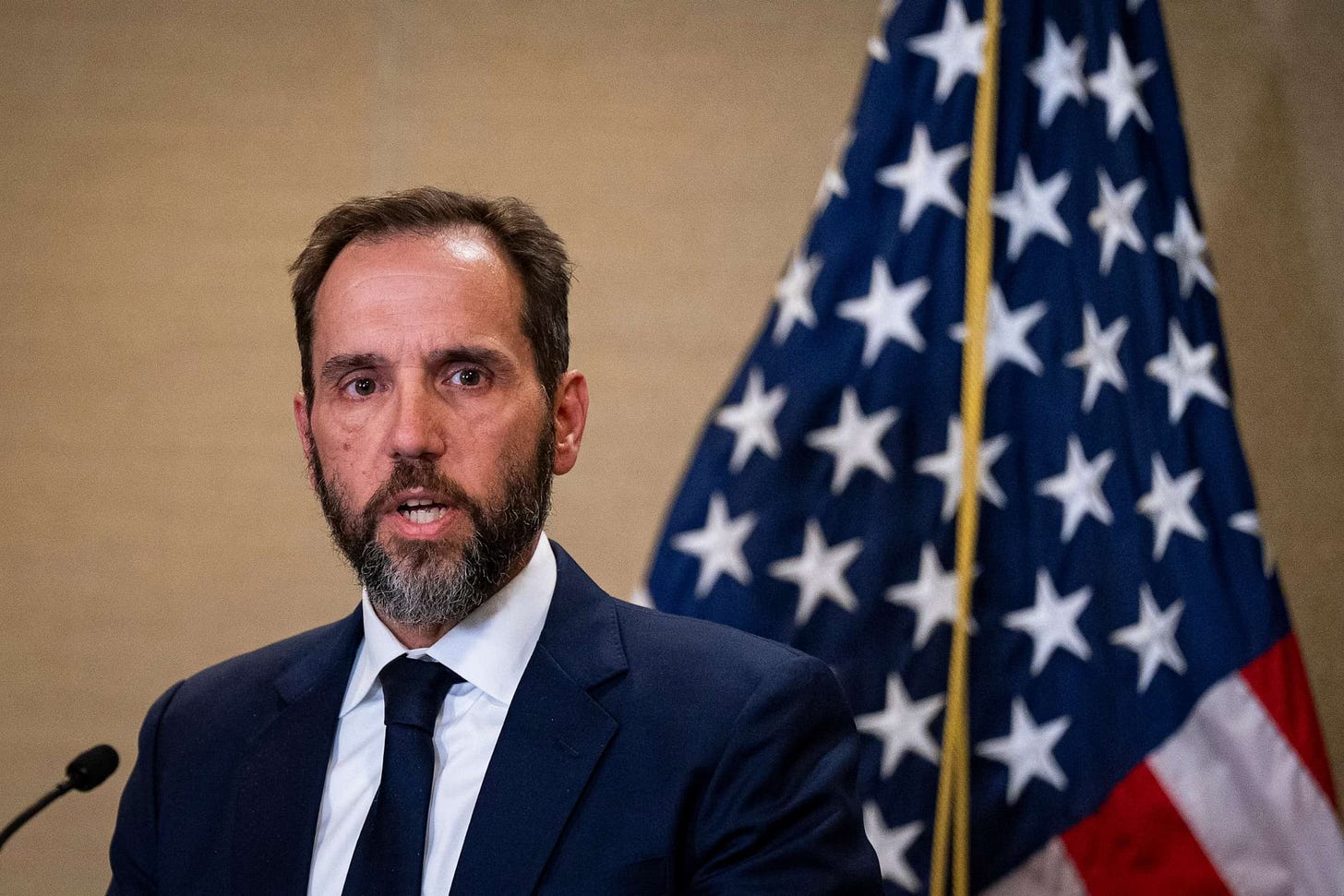When norms lead you astray
The judicial system had good reason to follow this path, but look where it ended
Special Counsel Jack Smith’s final report states for the record what has been clear to political observers for some time now: Trump running for and winning the presidency prevented him from being tried and convicted for his role in trying to overturn the 2020 presidential election. He ran for president to stay out of prison, and it worked.
My impression is that this is a case of adherence to (normally laudable) legal norms that led to a distinctly non-democratic outcome. The justice system essentially played itself. I’ll note here that I am not a lawyer and do not have legal training, but this impression comes from conversations with several law-talking people. (And please feel free to let me know if you think I got this wrong.)
Prosecutors from the Attorney General on down to state and local officials generally adhered to three main legal norms, which I’ll explain here in turn:
Norm 1: People affiliated with the current president’s party shouldn’t prosecute the most recent president of a different party
We have plenty of examples of highly politicized justice systems in other countries where one of the first things that happens when a new party takes power is the prosecution of people affiliated with the last regime. This causes people to lose faith in the criminal justice system, and it invites further political retribution down the road. U.S. prosecutors and other officials understandably want to avoid this sort of image.
Norm 2: The seriousness of the crime and the visibility of the suspect make it important to move slowly and thoroughly
Prosecutors knew that any charges brought against Trump — a universally famous figure with strong political allies and functionally limitless financial resources — would meet with significant delays and counter-motions. And because any trial would be so historic and precedent-setting, it was vitally important to make every effort for a prosecution to appear thorough. It should not skimp on details or avoid challenges, and any conviction should be convincing enough that it wouldn’t be overturned by another court. Yes, the stakes were high for this case, but that’s a reason to move slowly rather than quickly.
Norm 3: The judicial calendar does not follow the political calendar
Related to Norm 2, this is the idea that a prosecution should not function on an external timetable such as a coming election. The case should take as long as it needs to take.
The above norms make perfect sense under most conditions, and they are in service of the laudable goal of making the justice system appear apolitical and any convictions appear legitimate. But they crashed head on with some confounding factors.
The first of these factors is that no conviction of Trump, regardless of how thorough and above-board it is, would be accepted as legitimate by Trump and his supporters (which comprise a substantial portion of the electorate). This isn’t unique to Trump, by the way; we have plenty of evidence that people care about outcomes and not the procedures to reach those outcomes. But in this case, a quick and slipshod prosecution of Trump would have had roughly the same number of doubters as a lengthy and thorough one.
Secondly, it wasn’t just that this was a high-profile and well-resourced suspect; it was a suspect who was trying to become President of the United States and have the ability to thwart legal investigations of himself and his allies. It was important that prosecutors be thorough when going against targets like Martin Shkreli or Bernie Madoff, but there was no chance that, if the trial dragged on, those defendants were going to have the power of the pardon. Trump’s case was unique and should have been treated as such.
Norms should not be followed simply because they are norms; they should be evaluated in terms of the values behind them. In this case, those values — seeking to make the justice system appear apolitical — certainly have importance. But those values were abused by a defendant who did not share them.
It was perhaps unfair to rely on the criminal justice system to keep Trump out of office, when so many other aspects of the political system better designed for that sort of thing — the parties, the media, the voters — failed. Additionally, I am not certain that even a far more successful federal prosecution would have changed the political outcome all that much. Republicans still could have, and might well have, nominated Trump as a federal prisoner, and voters might well have elected him anyway. Recall that the Republican National Convention formally nominated Trump seven weeks after his criminal conviction on 34 felony counts, and I doubt a single delegate turned against him following that verdict.
But as a result of all this, next week Trump will join the rather notorious ranks of people who attempted a coup and were then later elected to the highest office in the land. People in the legal community will, I’m sure, be thinking about this outcome and the norm-adherence that led to it for decades to come. As the film No Country For Old Men (2007) thoughtfully asks us, “If the rule you followed brought you to this, of what use was the rule?”




I'm not arguing for slipshod, but a quick prosecution would have been better than none at all, which is basically what we got.
Trumpler…
He, a former insurrectionist attaining high office, is in frightening company.